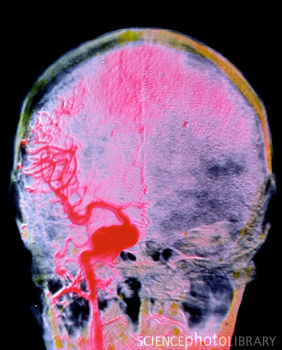
在美国,中风是造成病人残疾的第一诱因,还是第三大导致死亡的因素。近日,神经学家们发现一种调控神经细胞的蛋白可在病人中风后帮助维护大脑的正常功能,是防止长期损伤的关键因素。
该论文发表在最新一期的《Journal of Neuroscience》杂志上。科学与艺术学院的细胞生物学和神经学教授Bonnie Firestein发现了两种蛋白cypin和PSD-95的上调表达可导致完全不同的两种结果。
Cypin蛋白可调控神经细胞与神经元分支的功能,对于维护正常的脑部功能至关重要。其可保护神经细胞在初次发生中风时不受损伤,维护其与其他细胞交流的正常能力,并阻止脑部和神经组织的再次受损。而PSD-95蛋白会加速细胞损伤及抑制恢复。中风的二次损伤通常发生在初次损伤的数天,甚至是数周内,它表现为血流量不足、供氧不足和脑部肿胀。
Firestein说道:“我们还不清楚cypin蛋白在该进程中是如何发挥作用的,但我们知道其上调表达有助于神经细胞存活。” 自从十多年前首次分离并鉴定出cypin蛋白来,她们一直专注于研究其在脑部的功能,以及将其用于治疗精神性脑损伤和其它严重神经失调症的潜力。
Firestein和学生Chia-Yi Tseng在实验室中培养神经细胞并构建了一种“实验性中风”模型——模拟大量谷氨酸盐释放,并最终导致神经细胞坏死。
他们试图找到组织中风后二次损伤的方法,发现当cypin蛋白表达升高时,大量神经元细胞可避免二次损伤,而PSD-95蛋白过表达可导致初次未受伤的神经细胞死亡。
Firestein说道:“我们希望这项发现可用于未来开发有效的治疗策略,以降低中风和其它精神性损伤对脑部神经元的长期影响。”(生物探索译)
相关英文论文摘要:
The Role of PSD-95 and Cypin in Morphological Changes in Dendrites Following Sublethal NMDA Exposure
Focal swelling or varicosity formation in dendrites and loss of dendritic spines are the earliest indications of glutamate-induced excitotoxicity. Although it is known that microtubule dynamics play a role in varicosity formation, very little is known about the proteins that directly impact microtubules during focal swelling and dendritic spine loss. Our laboratory has recently reported that the postsynaptic protein PSD-95 and its cytosolic interactor (cypin) regulate the patterning of dendrites in hippocampal neurons. Cypin promotes microtubule assembly, and PSD-95 disrupts microtubule organization. Thus, we hypothesized that cypin and PSD-95 may play a role in altering dendrite morphology and spine number in response to sublethal NMDA-induced excitotoxicity. Using an in vitro model of glutamate-induced toxicity in rat hippocampal cultures, we found that cypin overexpression or PSD-95 knockdown increases the percentage of neurons with varicosities and the number of varicosities along dendrites, decreases the size of varicosities after sublethal NMDA exposure, and protects neurons from NMDA-induced death. In contrast, cypin knockdown or PSD-95 overexpression results in opposite effects. We further show that cypin regulates the density of spines/filopodia: cypin overexpression decreases the number of protrusions per micrometer of dendrite while cypin knockdown results in an opposite effect. Cypin overexpression and PSD-95 knockdown attenuate NMDA-promoted decreases in protrusion density. Thus, we have identified a novel pathway by which the microtubule cytoskeleton is regulated during sublethal changes to dendrites.







